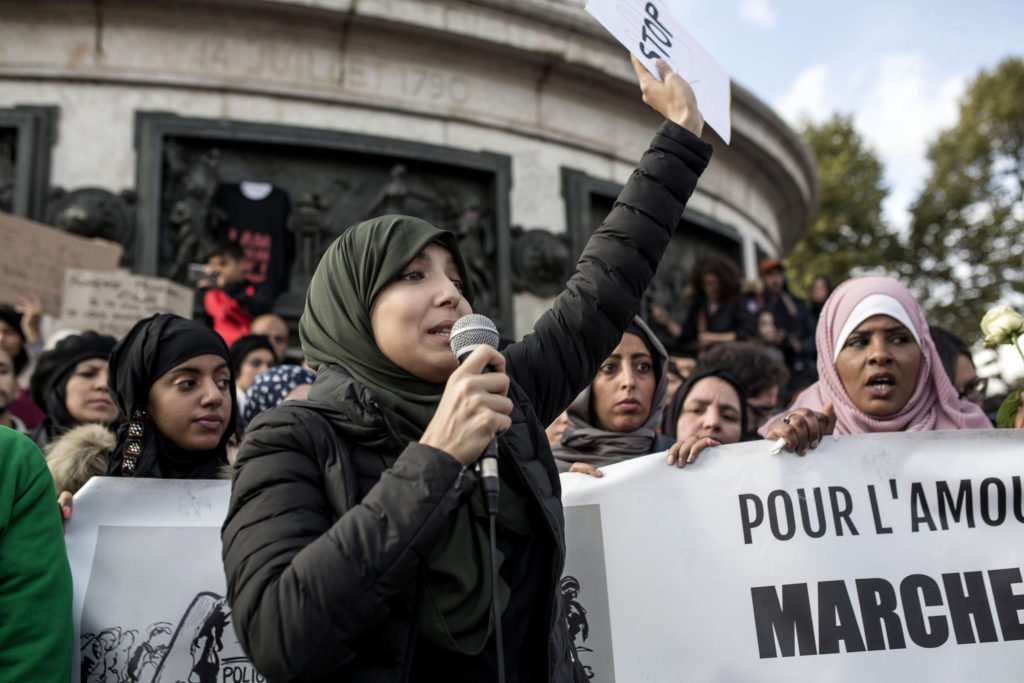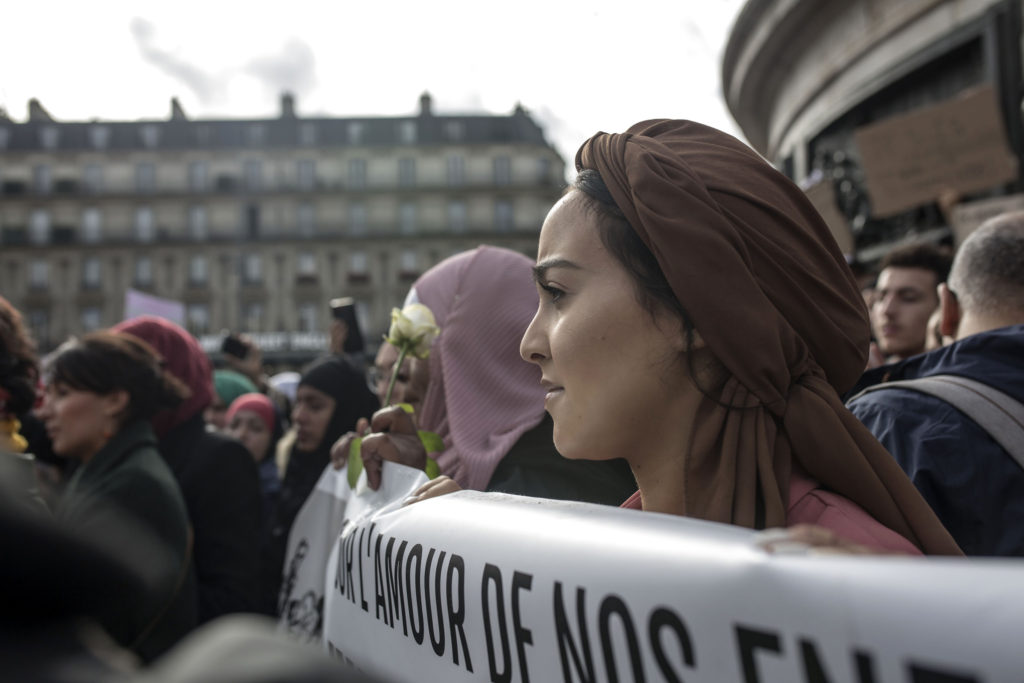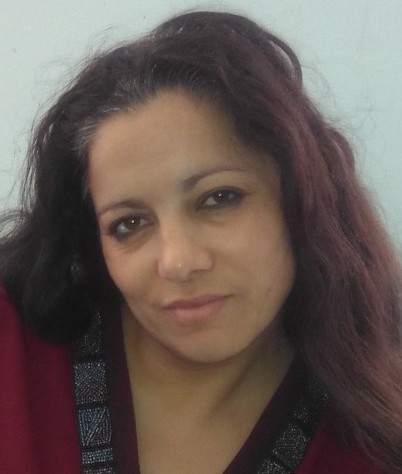
Translated by Isis Sadek.
France, similarly to the United States of America, is in the midst of an “organic crisis,” to use Antonio Gramsci’s term (210–18). With this, he names a crisis so sweeping that it threatens the stability of capitalism and its institutions. Indeed, as ultra-liberalism was imposed upon all peoples, the multi-dimensional crisis that it spawns has destructive consequences: an ecological and health crisis that wreaks devastation both economically and socially, as well as protest and anger rising from the four corners of the globe, including the most advanced capitalist countries whose working classes were protected up until recently (with the emergence of movements for economic and social justice such as the Occupy movement, los Indignados, les Gilets Jaunes or Yellow Vests…). To this, we must add another factor: that the established Western powers are competing with the new capitalist powers even as they are in fatal decline. This is precisely what heightens their aggressiveness and the danger they pose in international conflicts.
In France, this organic crisis is combined with a crisis of meaning so intense that it lays bare all the contradictions of the French myth. Whereas those who are not white have always known that the triptych “liberté, égalité, fraternité” is merely cosmetic, the white working classes are gradually becoming aware of the abyss that separates myth from reality, particularly since the state violently repressed the protests of the social movement and the Yellow Vests. The shock is such that some cartoonists jested: “Usually, it’s Black people or Arabs who get hit!”
In this, we touch upon an important contradiction that Macronism must solve: How to hold on to power while methodically undertaking a questioning of the long-standing compromise between Capital and Labor, which benefits the former, in a climate that exacerbates a social anger that first and foremost targets the government’s liberal politics and the state’s institutions?
Macron’s biggest fear is the erosion of the racial pact. The more the pressure applied by liberal forces undoes the social pact, the more those in power count on the solidity of this pact to enable them to continue to tie the destiny of the white working-class world to the bourgeois state. And when the racial pact weakens (as is evident in the convergence of the republic’s indigènes,[1] the social movement, and the Yellow Vests in their opposition of the police, as well as in the Left’s more accurate understanding of the Islamophobic phenomenon and of structural racism), power panics and has only one option: to reinforce the racial pact. This is one of the key functions of the notion of laïcité (secularism), a malleable signifier whose contents vary depending on the ideological necessities of the colonial counter-revolution. In fact, the aim is to substitute the principle of “justice”—the principal demand of all social movements—with that of laïcité, which is far from innocent. Laïcité is one of the governing classes’ greatest ideological deceptions and is aimed at redrawing objective solidarities between the beneficiaries of white supremacy and the state’s main interests to undermine a social and political bloc that opposes its power.

In this context, the nationwide homage to Samuel Paty, the teacher beheaded by a young radicalized Muslim, takes on the air of a national High Mass intended to unify the French people around the Jupiter-like figure of Macron. There is accordingly nothing innocent about this quasi-religious tribute to the murdered teacher. The secular national (sacred?) unity orchestrated around this crime (reminiscent of the unity forged in the aftermath of the terrorist attack against Charlie Hebdo) amounts to a reining in of critical public contestation of the official interpretation of the crime. The official narrative attributes terrorist attacks to those labeled “Islamist fanatics” who supposedly dislike the French way of life and democracy, and seek to impose Sharia law—and is combined with a hunt for Muslims that materializes in the dissolution of the charitable organization BarakaCity, in the threats to dissolve the CCIF (an organization that supports the struggle against Islamophobia), in minutes of silence observed in all schools and in the singling out of children who refuse to observe them (to this day, 400 children have been singled out and 150 complaints have been filed against children accusing them of justifying terrorism), in the muzzling of anti-racist and anti-imperialist organizations. Although comparisons have their limitations, historians of World War II remind us that, prior to the deportation of Jews and French collaborators by the Vichy regime, the first targets of state-perpetrated repression were Jewish humanitarian organizations and the anti-racist movement that was denouncing anti-Semitism and mobilizing against it. This parallel is as eloquent as it is frightening.
The main aim of the establishment becomes clear: to foreclose the emergence of other interpretations of the tragic murder. To use all means possible to prevent the meeting of the two angers (white anger and the anger of racialized populations) and the possibility of their convergence. These must be separated and partitioned. These two components of working classes must be pitted against one another, because, if united, they would pose a threat to the governing classes. Cynical as this may seem, the terrorist threat functions as a tool to adjust opinion along the national-republican line so that the racist consensus is restored and class solidarity is undermined. The threat of terrorism guarantees that that the white political forces of the Left, guided by their (immediate) racial interests, will fall back on their historical and structural chauvinism. Calls for national unity, to which the political forces of the radical Left hardly resist, play precisely this role. The stigmatizing accusation of “Islamo-Leftists” (uttered today in ways reminiscent of “Judeo-Bolshevik” in the past)—that the media use to accuse the Left engaged in the struggle against Islamophobia—aims to pressure this Left to renounce this project of unifying the two angers by charging it with a phantasmagorical complicity with terrorism. This accusation seeks to pressure the Left into once and for all abandoning its solidarity with Muslims and the (racialized) populations of the banlieues, or suburbs.
The main aim of the establishment becomes clear: to foreclose the emergence of other interpretations of the tragic murder. To use all means possible to prevent the meeting of the two angers (white anger and the anger of racialized populations) and the possibility of their convergence.
This is the analysis that should serve as a lens to understand the bill on separatism. At a time when material reality is undeniable, the wealthy classes, those who possess, are separatist in their refusal to share. They live in their ghettos for the wealthy as the French government prepares to vote on a law to criminalize the “separatism” imputed to Muslims—a social group that is exploited and discriminated against, one which the Republic’s racism has separated, and continues to separate, from white society. This is the hypocrisy of French “universalism.” This is the Lumières’ obscurantism.
[1] Indigènes refers here to the populations from the former French colonies that immigrated to France. They are part of the country’s working class and are typically targets of racism and thus are often referred to as racialized subjects of the republic.


les dites lumières ont toujours été obscures et j’en sais quelque chose pour avoir vécu en pays dominé ( Antilles -Guyane) qui a fait de moi l'”islamo-gauchiste” que je suis devenue en France par la nécessité du décolonial –
Merci courageuse Houria pour votre combat et l’analyse de notre pauvre laicité hexagonale/ parapluie